|
|
|
Sort Order |
|
|
|
Items / Page
|
|
|
|
|
|
|
| Srl | Item |
| 1 |
ID:
162874


|
|
|
| 2 |
ID:
162863


|
|
|
|
|
| Summary/Abstract |
Google Scholar (GS) is an important tool that faculty, administrators, and external reviewers use to evaluate the scholarly impact of candidates for jobs, tenure, and promotion. This article highlights both the benefits of GS—including the reliability and consistency of its citation counts and its platform for disseminating scholarship and facilitating networking—and its pitfalls. GS has biases because citation is a social and political process that disadvantages certain groups, including women, younger scholars, scholars in smaller research communities, and scholars opting for risky and innovative work. GS counts also reflect practices of strategic citation that exacerbate existing hierarchies and inequalities. As a result, it is imperative that political scientists incorporate other data sources, especially independent scholarly judgment, when making decisions that are crucial for careers. External reviewers have a unique obligation to offer a reasoned, rigorous, and qualitative assessment of a scholar’s contributions and therefore should not use GS.
|
|
|
|
|
|
|
|
|
|
|
|
|
|
|
|
| 3 |
ID:
162862
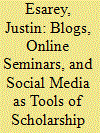

|
|
|
|
|
| Summary/Abstract |
How do political scientists use online tools as part of their scholarly work? Are there systematic differences in how they value these tools by field, gender, or other demographics? How important are these tools relative to traditional practices of political scientists? The answers to these questions will shape how our discipline chooses to reward academics who engage with “new media” such as blogs, online seminars (i.e., webinars), Twitter, and Facebook. We find that traditional tools of scholarship are more highly regarded and used more often than any new media, although blogs are considered most important among new media. However, we also find evidence that these webinars are used and valued at rates comparable to traditional tools when they are provided in ways that meet political scientists’ needs. Finally, we observe that women and graduate students are substantially more likely than men and tenure-track academics to report that webinars and online videos are important sources of new ideas and findings.
|
|
|
|
|
|
|
|
|
|
|
|
|
|
|
|
| 4 |
ID:
162852


|
|
|
| 5 |
ID:
162860
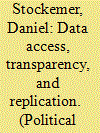

|
|
|
|
|
| Summary/Abstract |
Do researchers share their quantitative data and are the quantitative results that are published in political science journals replicable? We attempt to answer these questions by analyzing all articles published in the 2015 issues of three political behaviorist journals (i.e., Electoral Studies, Party Politics, and Journal of Elections, Public Opinion & Parties)—all of which did not have a binding data-sharing and replication policy as of 2015. We found that authors are still reluctant to share their data; only slightly more than half of the authors in these journals do so. For those who share their data, we mainly confirmed the initial results reported in the respective articles in roughly 70% of the times. Only roughly 5% of the articles yielded significantly different results from those reported in the publication. However, we also found that roughly 25% of the articles organized the data and/or code so poorly that replication was impossible.
|
|
|
|
|
|
|
|
|
|
|
|
|
|
|
|
| 6 |
ID:
162851
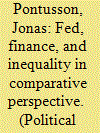

|
|
|
| 7 |
ID:
162848


|
|
|
| 8 |
ID:
162864


|
|
|
|
|
| Summary/Abstract |
This article responds to the stimulating comments of Kurt Weyland (2015) about the important but seldom discussed full professor promotion process. He suggested a number of problems, particularly candidates who are too eager to “go up” and institutions with insufficiently rigorous publication standards. Rather than proposing a top-down solution, Weyland urged associate professors to wait until they cleared a high research bar. By contrast, I see few systemic problems with the current promotion process. Although research is important, our academic ecosystem requires the valuing of a wide range of faculty activities and contributions. In addition, asking faculty to jump through even more research hoops may be ‘fiddling while Rome burns.’ It overlooks the crucial issue that we all face: making the case for the value of higher education to taxpayers, parents, lawmakers, students, employers, philanthropists, voters, and society. I am optimistic that we can do so, but it may require a new set of academic priorities—less of the status games that can animate our academic lives and more of a focus on how our work benefits society.
|
|
|
|
|
|
|
|
|
|
|
|
|
|
|
|
| 9 |
ID:
162871


|
|
|
| 10 |
ID:
162870


|
|
|
| 11 |
ID:
162875


|
|
|
| 12 |
ID:
162873


|
|
|
| 13 |
ID:
162859
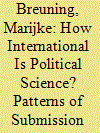

|
|
|
|
|
| Summary/Abstract |
How international in scope is publishing in political science? Previous studies have shown that the top journals primarily publish work by scholars from the United States and, to a lesser extent, other global-north countries. However, these studies used published content and could not evaluate the impact of the review process on the relative absence of international scholars in journals. This article evaluates patterns of submission and publication by US and international scholars for the American Political Science Review—one of the most selective peer-reviewed journals in the discipline. We found that scholars from the United States and other global-north countries are published approximately in proportion to submissions but that global-south scholars fare less well. We also found that scholars affiliated with prestigious universities are overrepresented, irrespective of geographic location. The article concludes with observations about the implications of these findings for efforts to internationalize the discipline.
|
|
|
|
|
|
|
|
|
|
|
|
|
|
|
|
| 14 |
ID:
162869


|
|
|
| 15 |
ID:
162866


|
|
|
|
|
| Summary/Abstract |
Students often find lectures on political science methodology difficult to grasp. Based on our success of simulations and games in teaching various political science theories, we created several mini-games to help students gain exposure in engaging ways with aspects of quantitative and qualitative methodology. We use techniques in which students learn through “gimmicks” (Schacht and Stewart 1990; 1992), for which they are the data points that they are studying. We believe that drawing conclusions based on what students do and think empowers them to better understand the sometimes tricky elements of political science methods. Each of the three games described in this article required little to no preparation time. We have used these mini-games in several courses and have received positive feedback from students about their utility. Thus, we are sharing them for more general use.
|
|
|
|
|
|
|
|
|
|
|
|
|
|
|
|
| 16 |
ID:
162850


|
|
|
| 17 |
ID:
162865


|
|
|
|
|
| Summary/Abstract |
Good education requires student experiences that deliver lessons about practice as well as theory and that encourage students to work for the public good—especially in the operation of democratic institutions (Dewey 1923; Dewy 1938). We report on an evaluation of the pedagogical value of a research project involving 23 colleges and universities across the country. Faculty trained and supervised students who observed polling places in the 2016 General Election. Our findings indicate that this was a valuable learning experience in both the short and long terms. Students found their experiences to be valuable and reported learning generally and specifically related to course material. Postelection, they also felt more knowledgeable about election science topics, voting behavior, and research methods. Students reported interest in participating in similar research in the future, would recommend other students to do so, and expressed interest in more learning and research about the topics central to their experience. Our results suggest that participants appreciated the importance of elections and their study. Collectively, the participating students are engaged and efficacious—essential qualities of citizens in a democracy.
|
|
|
|
|
|
|
|
|
|
|
|
|
|
|
|
| 18 |
ID:
162858


|
|
|
|
|
| Summary/Abstract |
Americans’ attitudes toward scientists have become more negative in recent years. Although researchers have considered several individual-level factors that might explain this change, little attention has been given to the political actions of scientists themselves. This article considers how March for Science rallies that took place across the United States in late April 2017 influenced Americans’ attitudes toward scientists and the research they produce. An online panel study surveying respondents three days before and two days after the March found that liberals’ and conservatives’ attitudes toward scientists polarized following the March. Liberals’ attitudes toward scientists became more positive whereas conservatives’ attitudes became more negative. However, the March appears to have had little effect on the public’s attitudes about scientific research. In addition to answering questions about the March’s political impact, this research calls attention to the possibility that the political actions of scientists can shape public opinion about them.
|
|
|
|
|
|
|
|
|
|
|
|
|
|
|
|
| 19 |
ID:
162861


|
|
|
|
|
| Summary/Abstract |
Whereas there is a substantial body of scholarship assessing the merits of student journals, and an equally sizable amount of how-to-publish advice for students in higher education, there is little empirical research exploring the content of disciplinary student publications. To gain a sense of what political science students are publishing, this study examines articles in three peer-reviewed student journals of politics between 2005 and 2015: The Pi Sigma Alpha Undergraduate Journal of Politics, Critique, and Politikon. Content analysis reveals the nature of published student work by subfield, methodology, and topic, with findings discussed in the context of research trends in the profession and the debate about advantages and disadvantages of student journal publishing.
|
|
|
|
|
|
|
|
|
|
|
|
|
|
|
|
| 20 |
ID:
162867
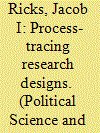

|
|
|
|
|
| Summary/Abstract |
Process-tracing has grown in popularity among qualitative researchers. However, unlike statistical models and estimators—or even other topics in qualitative methods—process-tracing is largely bereft of guidelines, especially when it comes to teaching. We address this shortcoming by providing a step-by-step checklist for developing a research design to use process-tracing as a valid and substantial tool for hypothesis testing. This practical guide should be of interest for both research application and instructional purposes. An online appendix containing multiple examples facilitates teaching of the method.
|
|
|
|
|
|
|
|
|
|
|
|
|
|
|
|
|
|
|
|
|